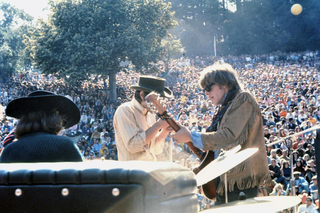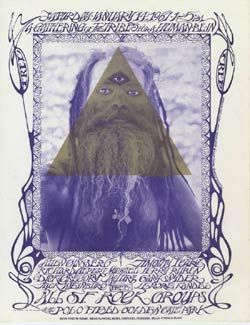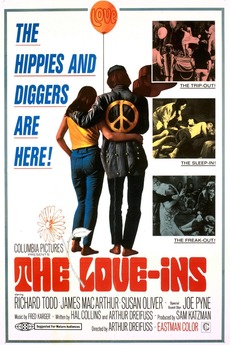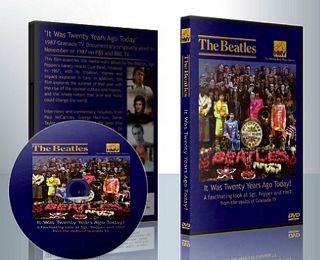
The Summer of Love was a major social phenomenon that occurred in San Francisco during the summer of 1967. As many as 100,000 people, mostly young people, hippies, beatniks, and 1960s counterculture figures, converged in San Francisco's Haight-Ashbury district and Golden Gate Park. More broadly, the Summer of Love encompassed hippie culture, spiritual awakening, hallucinogenic drugs, anti-war sentiment, and free love throughout the West Coast of the United States, and as far away as New York City. An episode of the PBS documentary series American Experience referred to the Summer of Love as "the largest migration of young people in the history of America".

A hippie, also spelled hippy, especially in British English, is someone associated with the counterculture of the 1960s, originally a youth movement that began in the United States during or around 1964 and spread to different countries around the world. The word hippie came from hipster and was used to describe beatniks who moved into New York City's Greenwich Village, San Francisco's Haight-Ashbury district, and Chicago's Old Town community. The term hippie was used in print by San Francisco writer Michael Fallon, helping popularize use of the term in the media, although the tag was seen elsewhere earlier.

The Charlatans were an American folk rock and psychedelic rock band that played a role in the development of the San Francisco Haight-Ashbury music scene during the 1960s. They are often cited by critics as being the first group to play in the style that became known as the San Francisco Sound.
The Diggers were a radical community-action group of activists and street theatre actors operating from 1966 to 1968, based in the Haight-Ashbury neighborhood of San Francisco. Their politics have been categorized as "left-wing;" more accurately, they were "community anarchists" who blended a desire for freedom with a consciousness of the community in which they lived. The Diggers' central tenet was to be "authentic," seeking to create a society free from the dictates of money and capitalism.

The Human Be-In was an event held in San Francisco's Golden Gate Park Polo Fields on January 14, 1967. It was a prelude to San Francisco's Summer of Love, which made the Haight-Ashbury district a symbol of American counterculture and introduced the word "psychedelic" to suburbia.
The Love Pageant Rally took place on October 6, 1966—the day LSD became illegal—in the 'panhandle' of Golden Gate Park, a narrower section that projects into San Francisco's Haight-Ashbury district. The 'Haight' was a neighborhood of run-down turn-of-the-20th-century housing that was the center of San Francisco's counterculture in the 1960s.

Haight-Ashbury is a district of San Francisco, California, named for the intersection of Haight and Ashbury streets. It is also called The Haight and The Upper Haight. The neighborhood is known as one of the main centers of the counterculture of the 1960s.

Flower power was a slogan used during the late 1960s and early 1970s as a symbol of passive resistance and nonviolence. It is rooted in the opposition movement to the Vietnam War. The expression was coined by the American Beat poet Allen Ginsberg in 1965 as a means to transform war protests into peaceful affirmative spectacles. Hippies embraced the symbolism by dressing in clothing with embroidered flowers and vibrant colors, wearing flowers in their hair, and distributing flowers to the public, becoming known as flower children. The term later became generalized as a modern reference to the hippie movement and the so-called counterculture of drugs, psychedelic music, psychedelic art and social permissiveness.
Chester Leo "Chet" Helms, often called the father of San Francisco's 1967 "Summer of Love," was a music promoter and a counterculture figure in San Francisco during its hippie period in the mid- to-late 1960s.
Claire Burch was an American author, filmmaker and poet.

Goa Gil was an American-born musician, DJ, remixer, and party organizer. He was one of the founders of the goa trance and psytrance movement in electronic music.

Quicksilver Messenger Service is the debut studio album of Quicksilver Messenger Service, released in May 1968. The group were among the last of the original major San Francisco bands to secure a recording contract, which meant that the album appeared many months after the debut efforts of Jefferson Airplane, Grateful Dead, Country Joe and the Fish, Moby Grape, and Big Brother and the Holding Company. Despite this, the album received acclaim and is considered a cornerstone release in the late '60s Haight discography.

The San Francisco sound refers to rock music performed live and recorded by San Francisco-based rock groups of the mid-1960s to early 1970s. It was associated with the counterculture community in San Francisco, particularly the Haight-Ashbury district, during these years. San Francisco is a westward-looking port city, a city that at the time was 'big enough' but not manic like New York City or spread out like Los Angeles. Hence, it could support a 'scene'. According to journalist Ed Vulliamy, "A core of Haight Ashbury bands played with each other, for each other"
The hippie subculture began its development as a youth movement in the United States during the early 1960s and then developed around the world.

The Love-Ins is a 1967 American counterculture-era exploitation movie about LSD that was directed by Arthur Dreifuss.
During the "hippie" period 1967–1968 in San Francisco, an individual named Al Rinker started an organization located at 1830 Fell St in the city's Haight Ashbury district called the Switchboard. Its purpose was to act as a social switchboard for people living there.

The Mantra-Rock Dance was a counterculture music event held on January 29, 1967, at the Avalon Ballroom in San Francisco. It was organized by followers of the International Society for Krishna Consciousness (ISKCON) as an opportunity for its founder, A. C. Bhaktivedanta Swami Prabhupada, to address a wider public. It was also a promotional and fundraising effort for their first center on the West Coast of the United States.

Jack O'Connell was an American filmmaker, actor & songwriter particularly noted for producing Greenwich Village Story (1963), Revolution (1968) and Swedish Fly Girls (1971).

It Was Twenty Years Ago Today is a 1987 British-made television documentary film about the 1967 Summer of Love. It premiered on 1 June 1987, twenty years after the official release date of the Beatles' album Sgt. Pepper's Lonely Hearts Club Band, and presents the album as the central factor behind the events and scenes that led to the full emergence of the 1960s counterculture.













